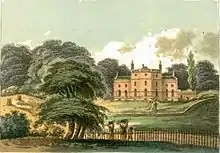Charles Dalbiac
Charles Dalbiac (1726–1808)[1] was an English Huguenot textile manufacturer. He was High Sheriff of Berkshire in 1784.[2]
Life
He was son of James D'Albiac, a Huguenot refugee, and younger brother of James Dalbiac (born 1720).[1]
In 1763 James and Charles Dalbiac occupied 20 Spital Square, in eastern London, as manufacturers of silk and velvet.[3] Around 1764 Charles Dalbiac owned Durdans, a house, near Epsom, Surrey.[4] It was rebuilt for him by William Newton, over the years 1764–1768.[5]

Dalbiac by 1784 acquired Hungerford Park, from a Mr Waters.[6] He had a new mansion built there, in the Italian style.[7] He then sold it, in 1796, to John Willes.[6]
Family
Dalbiac first married Suzanne de Visme.[8] They had two daughters:[1]
- Louisa, or Lucy, married Peter John Luard.[9]
- Susannah, or Susan.
By his second wife, Ann Le Bas, he had three children:[1]
- Sir Charles Dalbiac (born 1776).[9][10]
- George.
- Harriet, married Sir James Pitcairn (1776–1859).[11][12]
Notes
- David C. A. Agnew (1871). Protestant Exiles from France in the Reign of Louis XIV, Or, the Huguenot Refugees and Their Descendants in Great Britain and Ireland. Reeves & Turner. p. 305.
- William Nelson Clarke (1824). Parochial Topography of the Hundred of Wanting: With Other Miscellaneous Records Relating to the County of Berks. W. Barter. p. 55.
- "The St. John and Tillard estate: Spital Square", in Survey of London: Volume 27, Spitalfields and Mile End New Town, ed. F H W Sheppard (London, 1957), pp. 55–73. British History Online http://www.british-history.ac.uk/survey-london/vol27/pp55-73 [accessed 5 June 2016].
- "The Durdans - Epsom - Surrey - England, British Listed Buildings". Retrieved 29 June 2016.
- Howard Colvin (1978). A Biographical Dictionary of British Architects 1600–1840. John Murray. p. 592. ISBN 0-7195-3328-7.
- Daniel Lysons (1813). Magna Britannia;: Bedfordshire. Berkshire. Buckinghamshire.-v.2.Cambridgeshire. The county palatine of Chester.-v.3.Cornwall.-v.4.Cumberland.-v.5.Derbyshire.-v.6.Devonshire. pp. 296–.
- Daniel Paterson (1822). A new and accurate description of all the direct and principal cross roads in Great Britain. p. 554.
- Huguenot Society of Great Britain and Ireland (1998). Proceedings of the Huguenot Society of Great Britain and Ireland. The Society. p. 269.
- Sir Bernard Burke (1853). Index to Burke's dictionary of the landed gentry of Great Britain & Ireland. Colburn and Company. p. 377.
- Comprehensive Dictionary of the World. Mittal Publications. p. 7. GGKEY:H4YS7FFZYAN.
- The Peerage, Baronetage, And Knightage, Of Great Britain And Ireland For ... Including All the Titled Classes. Whittaker And Company. 1860. p. 456.
- "Pitcairn, Sir James - Biographical entry - Plarr's Lives of the Fellows Online". Retrieved 29 June 2016.
- Gentleman's Magazine, and Historical Chronicle. E. Cave. 1819. p. 189.
- John S. Amery (1913). Devon & Cornwall Notes & Queries. J. G. Commin. p. 384.